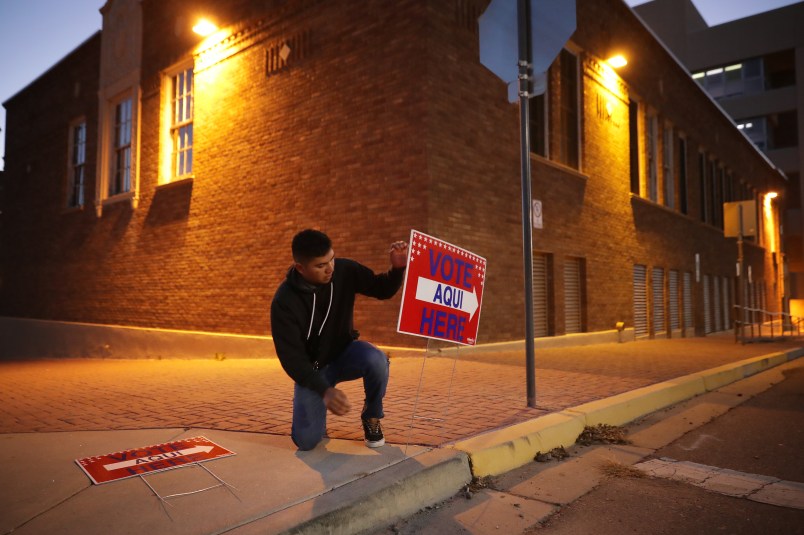Texas’s GOP-controlled Senate passed on party lines major changes to its election code that will make voting more cumbersome for people in Texas’ urban communities as well as for voters in need of assistance.
The vote brings the legislature closer to enacting some of the dizzying array of restrictive voting proposals that Republicans introduced in the statehouse this year. Attention will now turn to the House, where another significant bill is moving through the legislative process.
Several of the measures of the Senate bill, known as SB7, took aim at the way Harris County — home to Houston — made it easier to vote in 2020. The legislation bans drive-through voting and prohibits election officials from encouraging mail voting. It also limits in-person voting to a 15-hour period — between 6 a.m. and 9 p.m. — a provision aimed at Harris County’s 24-hour vote centers.
The legislation would hamper ballot access for minorities in other ways too. One section will require that large counties adopt a new formula for deciding where to set up polling places. That proposal will limit the extent to which election officials can take into account transportation access in deciding where to put polling locations, critics of the measure say. It will result in polling locations being shifted towards white suburban communities, where voters are more likely to have cars that can take them a greater distance to polling locations, and away from minority-heavy urban regions, where voters are more reliant on public transportation.
Other sections of the bill will loosen the reins on the actions that can be taken by partisan poll watchers, who have long been accused of engaging in intimidating tactics towards voters of color. Under they legislation, they would be allowed to record video in polling places and are authorized to roam freely throughout the election site.
The poll watcher provisions, as well as other parts of the bill, also single out voters in need of assistance — which often can be Spanish-speakers in need of language assistance or voters with physical impairments.
Poll watchers, under the legislation, will be allowed to record voters receiving assistance while they’re at the voting booth if the watchers believe the assistance is unlawful. The bill also requires that the people whom voters bring to assist them file additional paperwork, and it seeks to limit the number of people in the car with a voter who is using curbside voting.
During a floor debate that started Wednesday and stretched into the early morning hours on Thursday, Republican lawmakers opted to water down some, but not all, of the most controversial aspects of the bill.
The provision allowing poll watchers to record was amended to limit when and where they could share such recordings. The formula for determining polling place locations was tweaked to be based on eligible voters; it had previously been based on the number of voters in the past election which would have an even greater impact on moving polling places away from minority communities.
The bill’s sponsor also okayed the removal of a particularly controversial provision that would have required voters with disabilities to submit documents verifying their condition on an annual basis if they wanted to vote by mail.
The Texas House has its own major elections bill that has some similar provision to the legislation that the Senate passed Thursday. That bill gets a hearing in a House committee Thursday.







You know who else this will impact, students and all those young people moving into urban areas who mostly use public transportation.
And what’s up with limiting the number of people in a car that is bringing someone who need assistance with voting?
I still have an ideological problem with a poll watcher filming anyone who is there to vote. That means my image can be used and/or manipulated to show me doing something that I wasn’t doing. Though I have to admit that my polling place has only ever had official poll workers in there besides those waiting to vote. I just don’t think that anyone exercising their franchise needs to be on camera while they are voting.
So NOW is the time for corporate America to speak up and act in Texas, not after the fact.
Texas, you know how you’ve been drawing high-tech workers to your state recently? Well between your ‘deregulated’ infrastructure and this nonsense, you can start to kiss them buh-bye.
And you’ve also permanently surrendered the right to complain about bipartisanship of any form.
Do these Republicans understand that every backward step they take is making passage of the new federal voting standards now pending in Congress much more likely?
Naked voter suppression, Jim Crow style. Republicans being Republicans.